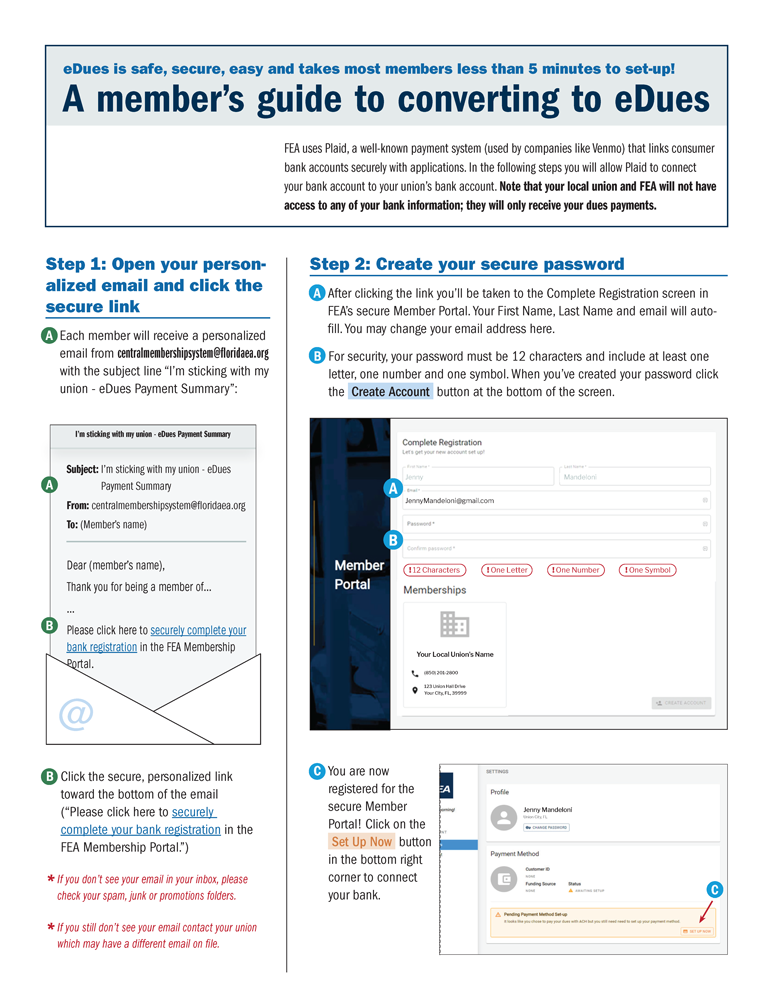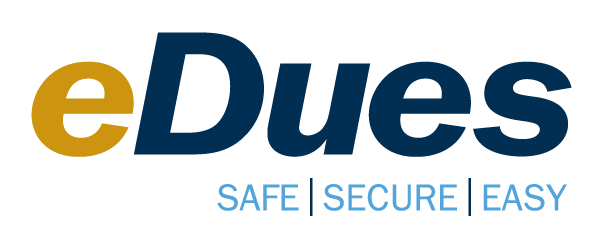
eDues is the new way for union members to automatically pay dues.
All members must make the switch to eDues to maintain their membership and protect their union contract.
Why? Despite massive opposition from workers across Florida, the Legislature passed SB 256 which outlaws payroll deduction of public employees’ union dues.
The Legislature is trying to silence educators and roll back our rights, but we won’t let them.
Tens of thousands of members like you are standing up for their profession and protecting the gains won through their local union contract.
By switching to eDues those members are saying loudly: I’M STICKING WITH MY UNION!
- Learn more on this page:
- How do eDues work?
- Members are saying "I'm sticking with my union!"
- Why now? Why is this happening?
- Learn more on this page:
- Frequently Asked Questions about eDues
eDues is safe
eDues uses Plaid, an industry-leader in account verification used by platforms like Venmo, to facilitate communication between your bank and your local union’s bank. This is done through an ACH (Automated Clearing House) payment — the same method most districts use to deposit your paycheck in your bank account. Plaid maintains secure connections to more than 12,000 financial institutions globally.
eDues is secure
Your local union and FEA do not store any of your banking information and are not directly involved in the eDues transaction.
At no point is your banking information in the hands of any local union or FEA representative or employee. Your local union only sees the payments and who is making them, not any protected information.
eDues is easy
Most members complete the switch to eDues in about 5 minutes by using their online banking credentials or their account number and bank routing number.
eDues is strength in numbers
From wages to health insurance, working conditions to job security, nearly every part of our work lives is covered by the contract your bargaining team — made up of members like you — negotiates with the school district. If you don’t make the switch to eDues you will lose your membership and put your local contract at risk for everyone.
eDues is private
Your local school district no longer has access to who is a union member. And neither FEA nor your local union store any of your banking information.
eDues is consistent
eDues payments occur on the same schedule as your dues are currently deducted from your paycheck. You only have to connect your bank account once.

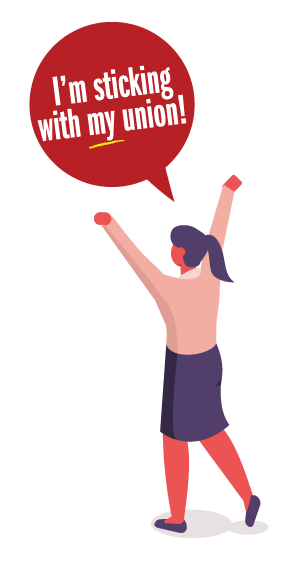
Your local union is working hard to roll out eDues!
You’ll be hearing from them soon about making the switch — if you haven’t already. Please contact your local with any questions using the tool below.
Displaying Results for County: and Job Classification:
Your selection returned no results. Please clear the filter and try again.
FEA is committed to protecting your data and privacy. As part of this commitment, we maintain comprehensive cyber liability insurance through a leading global carrier.
Why is this happening?
SB 256 is nothing more than an attack on our collective voice and our unions.
The bill strips educators and most other public employees — police and firefighters are not included — of the right to voluntarily pay your union dues through payroll deduction and raises the threshold of membership required to maintain local bargaining rights to 60%.
None of the hundreds of other payroll deductions across the state — like for health insurance or the United Way — are affected.
As union members, we value our right to join together to advocate for our students and our professions. This new law puts our union at risk — along with our negotiated contracts and legal protections at work.
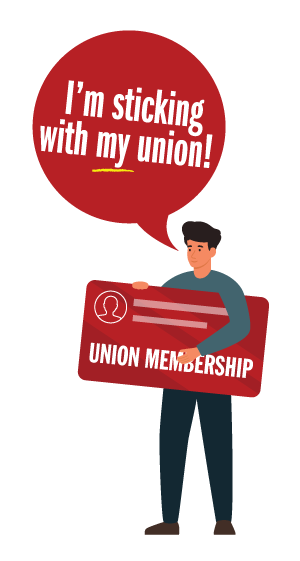
But members across Florida are not fooled. They are staying united, switching to eDues and saying proudly: “I’m Sticking With My Union!”
workers from across Florida spoke against SB 256.
people spoke for SB 256.
"Every single one of you workers is against this bill. It's interesting that the last three [and only] speakers [for the bill] were men in suits from think tanks and not actually people who are affected by this bill."
— Sen. Tina Polsky (D-Boca Raton) speaking during SB 256's first committee hearing.



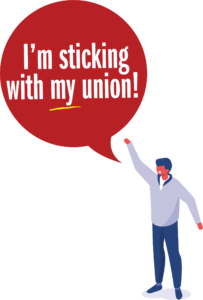
Frequently Asked Questions about eDues
Switching to eDues
- How do eDues work?
- How do I sign up for eDues?
- How long does it take to switch to eDues? What will I need?
- What if I did not receive my personalized eDues invite email?
- Does the personalized eDues invite email expire?
- Can I reuse the link in the invite email to get back into the portal?
- I've followed the instructions, but what if still need help signing up to eDues?
- What is a microdeposit?
- How do I find my microdeposit code?
- Where do I go to enter my microdeposit code?
- Where do I go to complete my registration or change my information?
- Can I sign up for eDues without using my online banking credentials?
- Can I sign up for eDues if I don’t do online banking?
eDues 101
- Why is our union changing the way we pay dues?
- Why did Florida lawmakers outlaw payroll deduction?
- What are eDues?
- Why should I switch to eDues?
- Are there additional benefits for signing up for eDues?
- What happens if I don’t switch to eDues?
- What happens to our union if other members don’t switch to eDues?
- Even if our union doesn’t exist, I'll still have my contract, right?
Security and other questions
Switching to eDues
How do eDues work?
eDues work the same way you use online banking to pay other bills, membership or subscriptions.
eDues uses Plaid, an industry-leader in account verification used by platforms like Venmo, to facilitate communication between your bank and your local union’s bank. Plaid maintains secure connections to more than 12,000 financial institutions globally.
This is done through an ACH (Automated Clearing House) payment — the same method most districts use to deposit your paycheck in your bank account.
How do I sign up for eDues
This 90-second video goes over the basics:

Signing up for eDues begins with an email from the Florida Education Association, which will be sent to your primary email address we have on record.
The email from centralmembershipsystem@floridaea.org — with the subject, “I’m sticking with my union – eDues payment summary” — will contain a secure link that is unique to you. Once you click on that link you will be taken to the secure portal where you can complete registration and link your bank account in three easy steps.
- Create your secure password. This password requires 12 characters with at least one letter, one number and one symbol. (You will see that your first and last names autofill and that you can change your portal email here.)
- Once you have registered, click the orange SET UP NOW button (in the bottom right corner) to link your bank account in one of two easy ways:
- (quickest method) Find and select your bank in the searchable list and follow the on-screen prompts. After clicking CONTINUE a new window will open and you will be prompted to log into your bank. Follow the prompts from your bank to connect your account to the Plaid system. (Note: each bank’s process is slightly different.)
- Scroll to the bottom of the list and select LINK WITH ACCOUNT NUMBERS. You will then be prompted to enter your bank’s routing number and your bank account number (checking or savings).If you use Method 2 (your bank account and routing numbers), you will receive a microdeposit to verify your account. Once you’ve received the microdeposit — which can take up to 3 business days — return to https://portal.floridaea.org, click the blue VERIFY NOW button and enter the three letter code attached to the $0.01 micro-deposit you received from Plaid. This is how Plaid verifies your account info.
- You will know the process is successful when you see the green box in your member portal.
How long does it take to switch to eDues? What will I need?
The process itself takes most members less than 5 minutes. If you receive a microdeposit you will have to wait 1-3 business days between starting and finishing the process.
You will need:
- a smart phone, tablet or computer;
- an internet connection;
- your personalized email from FEA; and
- either your online banking login info or your bank account and routing numbers. Many banks have their routing number published on their website.
What if I did not receive my personalized eDues invite email?
Reach out to your local union office (using the widget right or below) and verify that your union has your correct personal email address. Then, ask your local union to resend you the link.
Does the personalized eDues invite email expire?
No, the email does not expire. That being said, if your email was caught in your spam filter it could be automatically deleted by your email provider after a period of time.
If you can’t find your email, reach out to your local union office (using the widget right or below) and verify that your union has your correct personal email address. Then, ask your local union to resend you the link.
Can I reuse the link in the invite email to get back into the portal?
No, once you click the personalized link in the email and create your password, the link will no longer work.
To get back to the portal, visit https://portal.floridaea.org/
I've followed the instructions, but what if still need help signing up to eDues?
Many of your friends and colleagues have already signed up for eDues. You can start by asking them for help.
If you need additional help, contact your local union office (using the widget right or below).
What is a microdeposit?
Microdeposits are an easy way to verify your bank account information. Plaid does this by making a one-cent deposit into your account with a three-letter code linked to that deposit.
The Plaid microdeposit code is # followed by three letters — like #ABC, #JNP or #HWM. The three letters after the # are what you’ll need to enter in your member portal to complete your eDues setup.
How do I find my microdeposit code?
The microdeposit code will be on your bank statement — either online or the paper copy you receive from your bank. If you can’t access your statement you can call your bank to request the code.
On your statement you should see a $0.01 deposit 1-3 business days after linking your bank account to your eDues account. Alongside the deposit, you will see #xxx. The three letters after the # are your microdeposit code.
Where do I go to enter my microdeposit code?
Once you have found your microdeposit code on your bank statement, visit https://portal.floridaea.org, login using your email address and the password you chose when you created your FEA portal account and click the blue VERIFY NOW button and follow the prompts.
You will know the process is successful when you see the green box in your member portal.
Where do I go to complete my registration or change my information?
To complete your registration or to change your information at any time, you can visit https://portal.floridaea.org and login using your email address and the password you chose when you created your FEA portal account.
Can I sign up for eDues without using my online banking credentials?
Yes. If your bank is not found in our automated list or you don’t want to use your bank log in credentials, you can use your routing number and account number to link your bank account.
This option does require an added step.
Plaid will send a $0.01 microdeposit to your account. Once you’ve received the microdeposit return to https://portal.floridaea.org, click the blue VERIFY NOW button and enter the three letter code (after the #) attached to the deposit you received from Plaid.
Your eDues set-up will not be complete until you have logged back into the FEA member portal to enter the three letter code.
You will know the process is successful when you see the green box in your member portal.
Can I sign up for eDues if I don’t do online banking?
Yes. If your bank is not found in our automated list or you don’t want to use your bank log in credentials, you can use your routing number and account number to link your bank account.
This option does require an added step.
Plaid will send a $0.01 microdeposit to your account. Once you’ve received the microdeposit return to https://portal.floridaea.org, click the blue VERIFY NOW button and enter the three letter code (after the #) attached to the deposit you received from Plaid.
Your eDues set-up will not be complete until you have logged back into the FEA member portal to enter the three letter code.
You will know the process is successful when you see the green box in your member portal.
eDues 101
Why is our union changing the way we pay dues?
Gov. DeSantis has signed legislation (SB 256) stripping educators of your right to pay union dues through payroll deduction and raising the threshold of membership required to maintain local bargaining rights to 60 percent. FEA is working with your local union and our national unions to provide a new, safe and secure way for members to maintain and manage their dues.
Why did Florida lawmakers outlaw payroll deduction?
This type of “paycheck deception” legislation is nothing new and has been pushed across the country to weaken unions. Despite massive opposition from workers in Florida, the Legislature passed and Gov. DeSantis signed SB 256, which outlaws payroll deduction for most public employees. They believe converting 150,000 members to a new way of paying dues will take time and energy away from organizing for better contracts, more funding for public education, pro-public education candidates and respect on the job.
What are eDues?
eDues are the new safe, simple and secure way for members to pay their membership dues. eDues allows payment of your union dues through bank draft on the same schedule as your regular deductions from your paycheck.
Why should I switch to eDues?
Members across Florida are switching to eDues for all the reasons they joined their union in the first place: to have a strong collective voice, to take an active role in determining their working conditions and their students’ learning conditions, and to protect and improve public education.
The unfortunate reality is that with the passing of SB 256 members who don’t make the switch to eDues will lose their union membership — and the rights, privileges, benefits and collective voice that comes with it.
Making the switch to eDues maintains your membership and protects your union contract.
Are there additional benefits for signing up for eDues?
eDues protects your privacy. Paying union dues via payroll deduction allows school districts and school board members to view employees’ membership status, opening educators to targeting and retaliation. Paying union dues via bank transfer allows members to keep their union membership private from administrators.
What happens if I don’t switch to eDues?
If you do not make the switch to eDues you will no longer be a member of your union and will lose access to the rights, privileges and benefits of union membership.
Signing up for eDues avoids a break in your union membership, allows you to have a voice at the worksite and protects your rights into the future.
What happens to our union if other members don’t switch to eDues?
SB 256 puts our union at risk — along with our negotiated contracts and legal protections at work. Since local unions risk decertification as part of SB 256 unless they maintain 60% membership, by signing up for eDues, members can ensure they keep their contract in place.
If other members do not switch to eDues they jeopardize your local union’s ability to bargain working and learning conditions, and defend members’ rights on the job.
Even if the union doesn’t exist, I'll still have my contract, right?
More eDues resources
A step-by-step guide — with screenshots — of the eDues conversion process.

